 Petzlover
PetzloverBullenbeisser is originated from Germany but Indian Pariah Dog is originated from India. Both Bullenbeisser and Indian Pariah Dog are of same height. Both Bullenbeisser and Indian Pariah Dog are having almost same weight. Both Bullenbeisser and Indian Pariah Dog has almost same life span. Bullenbeisser may have more litter size than Indian Pariah Dog. Both Bullenbeisser and Indian Pariah Dog requires Low Maintenance.
Known also as the German Bulldog, the Bullenbeisser was a strong dog which is now unfortunately extinct. There were two regional types – the Brabanter- and the Danziger Bullenbeisser.This Molosser-type dog was native to Germany and was bred for different hunting purposes.
Nobody is quite sure what dogs are included in Molossers, but they are essentially large dogs bred to hunting and rescue, tending to have a shorter muzzle. The Bullenbeisser is famous for the role the dog has played in the development of the wonderful dog we have today, the Boxer. In fact, some Bullenbeissers were crossed by the Boxer Kennel Club of Germany with Bulldogs from the UK.
Not much is known about the history of the Bullenbeisser, but the breed also has a history in the lands of the Holy Roman Empire. The dog was at first a type of Mastiff, large and with the typical brachycephalic head, and used for hunting because of their power.
To improve their dogs, many Bullenbeisser breeders began crossing their dogs with English Bulldogs, introducing a white coat to the Bullenbeisser. Other breeds were also crossed with the dog such as the Bull Terrier, but by the end of the 19th century, the traditional Bullenbeisser was slowly dying out. It was in the late 1870s that German breeders, Hopner, Konig and Roberth used the dog to bring about a new breed, which today is known as the Boxer.
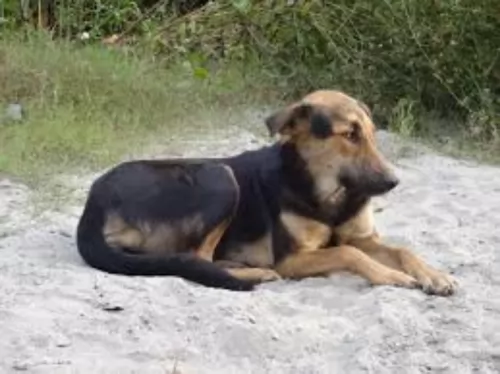 The Indian pariah, known also as the Indi-dog or In-dog, is an ancient dog breed common throughout India as well as Bangladesh.
The Indian pariah, known also as the Indi-dog or In-dog, is an ancient dog breed common throughout India as well as Bangladesh.
A breed standard does exist for the dog with the Indian Kennel Club and the dog has also been recognized by the Primitive and Aboriginal Dog Society.
A great dog enthusiast, Indian environmentalist, M Krishnan, has written about this ancient dog breed, telling about its wonderful temperament and its hardy constitution.
The Boxers lineage comes from the Bullenbeisser. The Bullenbeisser was a fierce, courageous dog, noted for its hunting abilities. The dog was developed into the Boxer so that its body become more defined and more streamlined.
Described as a medium to large muscular dog, standing roughly 63cm in height, he would have weighed in the region of 32kg. He had a short coat, brown eyes and short to medium ears which were half erect, half floppy.
Brown to fawn in color, he had a long tail which was later docked to give the dog a more distinctive, attractive look. The dog also got its attractive fawn color from the English Bulldog. Loyal, active and loving, the Bullenbeisser was a true family dog with a close affinity to children.
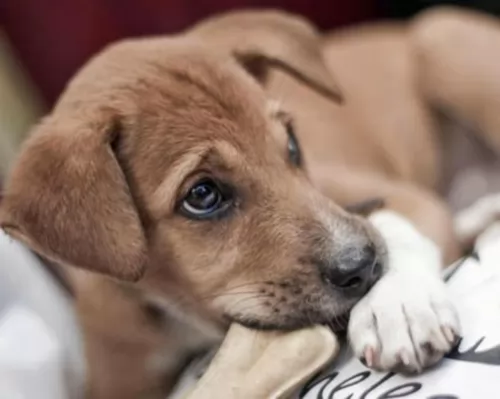 The Indian Pariah dog is a medium sized, lanky looking dog with the males and females standing at 46cm to 64cm in height and weighing roughly between 15 to 30kg.
The Indian Pariah dog is a medium sized, lanky looking dog with the males and females standing at 46cm to 64cm in height and weighing roughly between 15 to 30kg.
These dogs aren't big eaters so they tend to be lean and muscular. This is a double coated dog with the hair being coarse and fawn in colour or reddish brown.
He has fairly large, erect ears and brown eyes. He has a long tail which is held down but when he is excited it is held high and over the back, curling at the tip. There is sometimes white around the face and chest.
The Pariah dog is a social dog but he is somewhat timid, even though they make excellent watch dogs, being territorial around their human family. Being territorial, he can have an aggressive side to him so it is wise to have him trained and socialized as then he is obedient and capable of getting on well with children in the home.
These dogs are also very intelligent and therefore easily trained. He is an active dog and likes to be kept busy, wanting to be participating in the activities of his human family.
Information on the extinct Bullenbeisser is limited, but because he was used to bring about the Boxer you can be sure that he would have been fearless, courageous and territorial of his property and of his human family.
The Bullenbeisser would have been a good watch-dog and with the right kind of loving care, a most awesome and loving family companion.
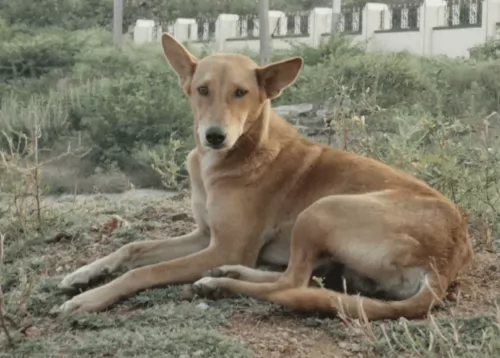 The Indian Pariah dog is just an ordinary dog looking to be a superb companion for you. These are dogs with no airs and graces and in fact they have lots of positive attributes about them.
The Indian Pariah dog is just an ordinary dog looking to be a superb companion for you. These are dogs with no airs and graces and in fact they have lots of positive attributes about them.
They are just your ordinary, social dogs who are able to form strong, loyal friendships with their human owners. He is a faithful dog breed and he has had a long association with humans dating back to thousands of years. He is healthy and cheerful and he is just waiting for you to give him a chance so that he can show you what a cheerful, playful, devoted, wonderful friend he can be to you too.
In general, medium to large breeds like the Bullenbeisser have a lifespan of 10, 11 or 12 years. The life expectancy of these dogs relied much on the lifestyle they led and their diets.
The Bullenbeisser had a deep chest and this made dogs like this prone to gastric dilatation and bloat which can be life-threatening and which requires immediate veterinary intervention. The dog with this disease has distension of the abdomen and extreme discomfort, wanting to vomit but being unable to do so.
Hip Dysplasia is a disease which is more common in larger dogs and is an abnormal formation of the hip socket, resulting in lameness accompanied by painful arthritis.
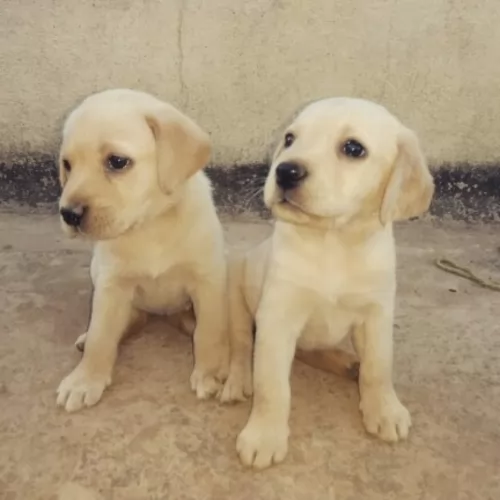 This is a dog which can live to between 13 and 15 years of age when he is treated well.
This is a dog which can live to between 13 and 15 years of age when he is treated well.
These Indian Pariahs are a natural dog breed, and to this end they are free of genetic health concerns such as hip dysplasia which is a very common ailment with nearly all dogs.
Remember that every dog stands a good chance of picking up some life-threatening illnesses if not vaccinated against them. Some of these diseases to be concerned about are canine distemper and parvo-virus. Rabies, kennel cough and parasites such as fleas and ticks can also pose a real danger to your pet.
The Pariah has been around for a very long time and today he is a robust, low maintenance pet that isn't going to cost you a lot of money .
The Bullenbeisser was a mastiff like breed with a short, easy-to-care for coat. He would have required a good brushing down at least twice a week to remove the coat from loose hairs. As an active, outdoor-type dog, he would have had to have his ears checked for dirt and the possibility of infection.
Although the Bullenbeisser was a hunting dog, he no doubt led an active outdoor lifestyle. Dogs such as the Boxer and the Mastiff, which are descendants of this dog are the kind of dogs which will need to be exercised regularly, taken on walks and given lots of running games with a ball.
As a medium to larger breed with lots of energy, the Bullenbeisser would have no doubt had home-made food from his master’s table. This food would have included meat and vegetables. As a hunting dog he would have had the chance to get in some raw meat which is imperative for the health of any domesticated dog today.
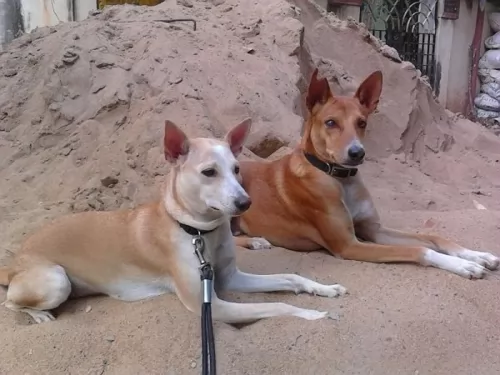 This is a low maintenance dog who also happens to shed little. A brush once or twice a week will be sufficient and it will keep the fur shiny and healthy.
This is a low maintenance dog who also happens to shed little. A brush once or twice a week will be sufficient and it will keep the fur shiny and healthy.
Your puppy will need to be vaccinated at 6 weeks of age. There are some veterinary clinics in India that offer free vaccine shots. Your puppy will be dewormed too. Make sure he has a nice dry, warm place to sleep, and for during the day, ensure that there is a shady spot for him too.
It's always a good idea to try and feed your puppy the best food there is. If you visit a veterinary clinic, find out what the most appropriate food would be for your puppy and how often you should feed him during the day.
If you feed your adult Indian Pariah dog kibble and you're able to, try and add in some home-made food too such as cooked chicken or rice. Some raw meat added in from time to time will also do your dog the world of good. Make sure there is always a bowl of cool, clean water standing by.